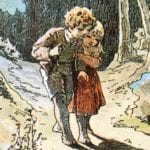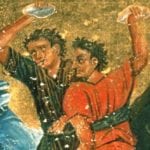 Crime
Crime  Crime
Crime  Technology
Technology 10 Hilariously Over-Engineered Solutions to Simple Problems
 Miscellaneous
Miscellaneous 10 Ironic News Stories Straight out of an Alanis Morissette Song
 Politics
Politics 10 Lesser-Known Far-Right Groups of the 21st Century
 History
History Ten Revealing Facts about Daily Domestic Life in the Old West
 Weird Stuff
Weird Stuff 10 Everyday Products Surprisingly Made by Inmates
 Movies and TV
Movies and TV 10 Actors Dragged out of Retirement for One Key Role
 Creepy
Creepy 10 Lesser-Known Shapeshifter Legends from Around the World
 Animals
Animals 10 Amazing Animal Tales from the Ancient World
 Gaming
Gaming 10 Game Characters Everyone Hated Playing
 Crime
Crime 10 Terrifying Serial Killers from Centuries Ago
 Technology
Technology 10 Hilariously Over-Engineered Solutions to Simple Problems
 Miscellaneous
Miscellaneous 10 Ironic News Stories Straight out of an Alanis Morissette Song
Who's Behind Listverse?

Jamie Frater
Head Editor
Jamie founded Listverse due to an insatiable desire to share fascinating, obscure, and bizarre facts. He has been a guest speaker on numerous national radio and television stations and is a five time published author.
More About Us Politics
Politics 10 Lesser-Known Far-Right Groups of the 21st Century
 History
History Ten Revealing Facts about Daily Domestic Life in the Old West
 Weird Stuff
Weird Stuff 10 Everyday Products Surprisingly Made by Inmates
 Movies and TV
Movies and TV 10 Actors Dragged out of Retirement for One Key Role
 Creepy
Creepy 10 Lesser-Known Shapeshifter Legends from Around the World
 Animals
Animals 10 Amazing Animal Tales from the Ancient World
 Gaming
Gaming 10 Game Characters Everyone Hated Playing
10 Obscure And Deeply Odd Fairy Tales Written By Hans Christian Andersen
While many readers are well aware that some of Hans Christian Andersen’s original stories are far more morbid than anything you’ll see in a Disney movie, many are unfamiliar with the rest of his vast collection of original fairy tales, which sometimes delve into realms so strange as to make him seem more like Edgar Allan Poe than a writer of children’s stories.
Here today, we have collected ten of Andersen’s many peculiar, and sometimes downright disturbing, fairy tales, all of which are far more obscure than his more well-known works, which include such beloved childhood classics as “The Ugly Duckling,” “Thumbelina,” “The Princess and the Pea,” “The Little Mermaid,” and “The Emperor’s New Clothes.” Come for a little wander with us into the clearly troubled but undeniably creative mind of one of history’s most popular fairy tale authors. But make sure your kids are tucked up safe and asleep in bed because some of these tales are the stuff of nightmares.
10 ‘The Stone Of The Wise Men’
Now his thoughts were great and bold, as our thoughts generally are at home in the corner of the hearth, before we have gone forth into the world and have encountered wind and rain, and thorns and thistles.
In the tallest tree in India stands a castle made of crystal that looks out over the whole world. In this castle lives a very wise man who owns a book in which everything ever known is written. He seeks answers about what will happen after death, but the page in the book concerning the afterlife cannot be read without the light from a magical stone made from the good qualities that hold the world together.
The wise man has five children, and each of them is blessed with one particularly well-developed sense. One can see further than anyone else in the world, even deep into the Earth and into the human heart. One can hear grass growing. One can smell everything there is to smell. One has the most accurate and advanced taste. The fifth, a blind daughter, can feel more vividly than anyone else, as though she has eyes in her fingertips and ears in her heart.
One by one, the children go out into the world to find the stone. The son who can see is blinded by the Evil One. The son who can hear is driven insane by all the screaming in the world and all the heartbeats, which to him sound like a million clocks. He pushes his fingers so deep into his ears that he ruptures his own eardrums. The son who can smell is thwarted with incense smoke made by the Evil One. The son who can taste ends up stuck atop a church steeple in a weather balloon.
The blind sister now ties a magical thread to her father’s house so that she won’t lose her way in the world and leaves to find the stone. The Evil One makes a doppelganger of her using stagnant marsh water bubbles mixed with tears shed by envy and paints it with rouge scraped from the cheeks of a corpse.
Despite the Evil One’s best efforts, the daughter acquires the stone, which illuminates the wise man’s book to reveal one word: “Faith.”[1]
9 ‘The Swineherd’
For a plaything you kissed the swineherd, and now you have your reward.
There was once a prince who wished to marry the emperor’s daughter. In the hopes of being able to meet her, he sends her two gifts. The first is a rose that only blooms once every five years and is so beautiful that anyone who smells it forgets all sorrow and trouble. The second gift is a nightingale that can sing all the melodies in the world. The emperor is so moved by the gifts that he weeps like a child, but his daughter throws them away in disgust, for neither are artificial.
The prince then disguises himself in rags and stains his face with dirt before seeking employment at the palace. He becomes the emperor’s swineherd. In his dirty little hut, he creates a magical pot that the emperor’s daughter takes a shine to, but he will only sell it to her for ten kisses. Eventually, her desire for the pot becomes so strong that she gives the grubby swineherd his kisses, and then she goes away happy. Next, the swineherd makes a magical musical rattle, but this he will only sell for 100 kisses. The emperor’s daughter lusts after the rattle and eventually gives the swineherd the kisses he desires. When the prince is taking his 86th kiss, the emperor discovers his daughter in the pigsty kissing the dirty swineherd. Disgusted, he beats them both over the head with his slipper and banishes them from his kingdom.
As the emperor’s daughter cries in the rain, the swineherd goes behind a tree and washes the mud off his face. He throws away his rags and changes into his princely garb before revealing himself to the dejected princess. He is so handsome that she falls to her knees before him, but he tells her that he has come to despise her. She threw away a prince’s beautiful gifts, but for a plaything, she kissed a swineherd. Disgusted, he goes inside and shuts the door in her face.[2]
8 ‘The Garden Of Paradise’
One moment of such happiness is worth an eternity of darkness and woe.
A prince who gets caught in a storm takes shelter in a great cavern with an old woman who is so large and strong that she looks like a man. One by one, the woman’s four sons arrive, each being one of the four winds of Heaven. The North Wind has been drowning walrus hunters at sea, the West Wind has been watching a buffalo struggling in a river before it goes over a waterfall, and the South Wind explains that he has killed a group of travelers in a desert storm and looks forward to the day when he can blow the sand off their bleached bones. His mother, none too pleased with this, puts him in a sack and sits on him. The East Wind arrives and explains that he has been in China watching important men being whipped with bamboo canes that break on their backs. The East Wind is about to visit the Garden of Paradise, where Adam and Eve gave in to temptation. He only travels there once every 100 years, but as he is about to depart for the garden, he offers to take the prince along with him.
In the beautiful garden, the prince meets the queen of the fairies, who lives under the tree of knowledge. The tree weeps tears of blood for the sins of mankind. The fairy tells the prince that he may stay in the garden and live with her for the next 100 years if every single night, he resists the temptation to kiss her.
On the very first night, the fairy beckons to the prince seductively before undressing and lying down beneath the great tree. The prince becomes so blinded by lust that he can no longer tell if the tree is weeping tears of blood or if red glittering stars are falling from its boughs. He realizes that the moment of bliss he is experiencing is worth a lifetime of suffering on Earth, so he leans over the fairy and kisses the tears from her sleeping eyes before kissing her lips.
Paradise sinks deep into the Earth, and the prince wakes up beside the cavern of the winds. Death arrives and condemns the prince to wander the Earth in hope of finding a way to atone for his sin.[3]
7 ‘On The Last Day’
It was a wonderful masquerade, and it was in particular quite strange to see how all of them concealed something carefully from each other under their clothing; but the one tugged at the other that this might be revealed, and then one saw the head of some animal sticking out: with one it was a grinning ape, with another an ugly goat, a clammy snake, or a flabby fish.
This strange little tale is about the things an intensely religious man experiences after he dies, and none of them are very pleasant.
As the man follows Death in the afterlife, he witnesses a bizarre masquerade of masked people, some dressed in rags and some in riches, and peeping out from all their garments are animals. The people are trying to pull apart each other’s robes to reveal the shame they hide beneath. Death explains that the masquerade is human life, and the shame beneath their clothes is the wild animal we all carry within us that struggles to get free.
As they continue through the afterlife, hundreds of large, black birds begin to follow the man and scream at him, “Thou wanderer with Death, rememberest thou me?” They chase him, screaming relentlessly until the sound of it fills the whole world, and Death tells the man that these birds are all the evil thoughts and desires he had during his lifetime. As he tries to escape the birds, the man realizes he is slicing his bare feet on jagged stones that cover the ground for as far as his eyes can see, covering the earth like fallen leaves. He cries out in agony, and Death tells him that the stones are every word the man ever uttered that wounded another person—words which cut hearts deeper than the stones cut his feet.
The man is eventually given the mercy he could not give others in life and is allowed into Heaven.[4]
6 ‘The Wicked Prince’
It was beautiful to behold, like the tail of a peacock, and seemed to be studded with thousands of eyes, but each eye was the muzzle of a gun.
This is a tale about a prince who becomes so bent on conquering the world that he turns to great evil to accomplish his dreams. His army ravages the whole world, burning everything in their path. Mothers who attempt to hide in smoking ruins with their children are actively hunted by the soldiers. The women become “food for their diabolic fury” as unspeakable things are done to them. The prince chains the kings of conquered kingdoms to his chariot and forces them to kneel at his feet to eat scraps when he feasts.
Eventually, the prince attains so much wealth and glory that he decides to conquer Heaven. He builds a magnificent ship with hundreds of eagles harnessed to it that pull it through the air. The ship is covered in what looks like thousands of glittering eyes, but they’re actually the muzzles of thousands of guns. As the prince travels toward the Sun, an angel appears. The prince orders the ship to open fire. The bullets bounce off the angel, but one drop of his blood plummets toward the ship and shatters a great hole in it. As the ship falls to the Earth, the clouds (which are made from the smoke of the cities he has burned) twist into monstrous shapes that reach toward the prince. Eventually, the ship crashes into the branches of a great forest, but the prince survives and vows he will continue his quest to conquer Heaven.
For seven years, he builds an entire fleet of sky ships and gathers a great army of soldiers from all the countries of the world, but as they’re about to board the ships, Heaven sends its own army against them: a single swarm of gnats. The prince flies into a manic rage as they bite and sting him. One gnat then crawls into his ear and bites him deep in his eardrum, where the poison penetrates into his brain and drives him mad. Screaming, the prince tears his clothes off and dances about naked before his savage soldiers, who jeer and mock him.
And that is how the prince who wanted to conquer Heaven was himself overcome by a single little gnat.[5]
5 ‘The Story Of A Mother’
Weep your eyes out into me.
In this depressing little tale, Death steals away in the night with a sick baby. The child’s mother runs into the snowy darkness and asks a woman dressed in black which way Death went. The woman, who says she is the night, makes the mother sing every song she ever sang to her child before she reveals where Death went with the baby. Night directs the mother into the dark woods, and there, she comes to a crossroads. A thorn bush which stands there refuses to tell the mother which path Death took unless she warms the cold thorns against her bosom. As she holds the thorns close to her heart, they pierce her breasts, and her blood pours over the frozen branches, where flowers start to bloom.
Next, the mother comes to a lake she cannot cross, so she tries to drink it, but the lake tells her it will carry her across if she will weep her eyes into the water so it can keep them as beautiful pearls. She cries her eyeballs out into the water, and the lake carries her to the great greenhouse where Death keeps all the flowers and trees that each exist for a beating heart on Earth. An old woman there tells the mother how to find her child’s flower by listening for its heartbeat among the millions of heartbeats in the garden. In exchange for the mother’s beautiful black hair, the old woman tells her to threaten Death by saying she will pull up the flowers of other living children, killing them, if Death won’t give her own child back.
When Death arrives, he gives the mother back her eyes so she may view two lives in a magical well. One life is prosperous and full of joy; the other is full of pain, poverty, and misery. Death then reveals that one of those lives is the one her child will have if it lives. Terrified that her child might have to suffer the life of misery, the weeping mother begs Death to take her child away with him and prays to God to ignore her whenever she desires something that is against His will.
Death leaves, taking her child away with him to the unknown land.[6]
4 ‘The Elfin Hill’
They danced in shawls made of moonshine and mist, which look very pretty to those who like such things.
In “The Elfin Hill,” a magnificent feast is to be held so that two Norwegian goblins may choose a bride from the elf king’s fair daughters. These maidens are like masks: beautiful in the front but hollowed out behind so that their backs are completely empty.
The grave horse is to be invited to the feast, and the footnotes to the story explain that this creature comes from an old Danish superstition where a horse is buried alive beneath every church. Each night, the dead horse digs itself up and limps to the houses of those who are going to die. The night raven, which is another creature from old Danish superstition, is to deliver the invitations. Night ravens are born when a priest condemns a ghost to be buried in the earth. A stake is driven into the ground where the spirit is buried, and at midnight, when the ghost begins to scream, the stake is pulled out, and the spirit is excommunicated, flying away in the form of a raven with a hole in its left wing.
The feast itself is terrifying, including such atrocious delicacies as children’s fingers wrapped in snail’s skins and wine from grave cellars. There are to be spit-roasted frogs and salads made from hemlock, damp mouse muzzles, and mushroom spawn. For dessert, there will be plenty of sweets mixed with rusty nails and broken glass from church windows.
The elf king’s hollow daughters display their bizarre and mysterious array of gifts to the goblin lord and his sons. The sons decide they don’t want a wife and prefer to run around blowing out will-o’-the-wisps, but the old Norwegian goblin decides that he likes one of the hollow daughters so much that he will marry her himself, since she can tell stories about any subject, as many as one could wish.
They swap boots, which is far more fashionable than swapping rings, and dance in each other’s shoes until sunrise.[7]
3 ‘The Tinderbox’
It will be the last pipe I smoke in this world.
A soldier comes across an exceedingly ugly old witch as he is returning home from war. The witch tells the soldier that he will be rich if he climbs inside a nearby tree to fetch her grandmother’s tinderbox. In the tree, there are three chests full of money, one guarded by a dog with eyes as big as teacups, one by a dog with eyes as big as mill wheels, and the last by a dog with eyes as big as the round tower of Copenhagen. She gives him her blue checked apron and explains that if he places each dog upon it, he will be able to pass by unhindered.
The soldier returns to the witch with his boots, cap, knapsack, and pockets full of gold, but he won’t give her the tinderbox until she tells him what it’s for. She refuses, and so, as any reasonable person would do, he cuts her head off and leaves her dead at the side of the road.
The soldier takes his gold to the nearest town and lives in luxury until his money runs out. He falls into poverty, but one night, he strikes the tinderbox, and the dog with eyes as big as teacups appears, asking, “What are my lord’s commands?” The soldier discovers he can summon all three dogs with the tinderbox, and they’ll bring him anything in the world he could want.
Wealthy again, the soldier becomes obsessed with the idea of seeing a princess whose father has locked her away in a copper castle because he heard she’d marry a common soldier. One night, the soldier asks one of the dogs to fetch the princess as she sleeps, and she’s so beautiful that he can’t stop himself from kissing her. The queen finds out about this and hatches a plan to spy on the princess in the hopes of finding out where the soldier lives. For the next two nights, the soldier asks the dog to bring him the sleeping princess so that he can kiss her, as he has fallen in love with her. The dog manages to outwit the queen once, but on the second night, the queen finds the soldier’s home, and he is thrown in prison to await execution.
As he stands at the gallows, the soldier’s dying wish is to smoke his pipe. He strikes flame with his tinderbox once, twice, thrice. All three dogs appear, and a bizarre massacre ensues. With their teeth, the dogs grab the officers, the judge, the councilors, and even the king and queen and throw them so high into the air that their bodies are all broken up into pieces when they hit the ground.
Everyone who is left alive is so terrified that they instantly proclaim the soldier their new king. He marries the princess, and the dogs all sit at the table during the wedding feast, watching all the guests with their massive, terrifying eyes.[8]
2 ‘The Shadow’
On the whole, it is a despicable world. I would not be a man if it were not commonly supposed that it is something to be one.
A learned young man catches a glimpse of a beautiful maiden standing on a balcony and becomes obsessed with learning her identity. One night, he jokingly tells his shadow to creep through the crack in her door to learn what it can about her. The next morning, the young man discovers that his shadow is gone, but this isn’t such a tragedy, as a new shadow starts growing from the stump of the old.
With a brand new shadow, the young man returns home. Years pass before a very thin and beautifully dressed stranger pays him a visit. The stranger claims to be the man’s old shadow. He found an otherworldly twilight in the house across the street, where he learned everything there is to know, including how to recognize himself as a man. Then the shadow crept naked into the world. He slid up shadows in the moonlight and peered through windows, where he saw despicable things happening between husbands and wives and parents and children, things that no one ought to see but everyone secretly wants to know—the secret, evil conduct of their neighbors. With this knowledge, the shadow blackmailed and terrorized people into giving him money, beautiful clothes, and prestige.
More years pass, and the man falls into poverty until his shadow eventually returns again and convinces his former master to come on a journey with him. The former master doesn’t know it yet, but the shadow longs for the man to be his own shadow.
At a healing bathhouse, the shadow tricks a princess into falling in love with him. He shows her that his own “shadow” (who is really his old master) not only looks like a real man but also has a shadow of his own, which the princess finds most impressive. The princess asks the shadow to marry her, but the former master tries to put a stop to the wedding, as it is not right for a woman to marry a shadow who is only pretending to be a man. The shadow tells the princess that his shadow has gone mad and has started to think he is a real man.
That night, a magnificent wedding takes place, but the former master doesn’t get to see the festivities, for he has already been executed.[9]
1 ‘The Traveling Companion’
On every tree hung three or four king’s sons who had wooed the princess, but had not been able to guess the riddles she gave them. Their skeletons rattled in every breeze, so that the terrified birds never dared to venture into the garden. All the flowers were supported by human bones instead of sticks, and human skulls in the flower-pots grinned horribly. It was really a doleful garden for a princess.
A young man named John is wandering the world after his father dies. While taking shelter in a church, John discovers two men attempting to desecrate the corpse of a man who owed them money before he died. John pays the corpse’s debt, handing over his entire inheritance to the two men. Broke but happy, he continues to wander until he meets a mysterious stranger who becomes his traveling companion, and through a series of adventures, the companion gains three birch rods, a sword, and the severed wings of a massive swan.
Eventually, John sees the most beautiful princess in all the world and falls in love with her, despite the fact that she is a psychotic murderer. If a suitor cannot tell her what she is thinking three days in a row, he becomes a corpse in her garden of bones, full of the skeletons of her suitors. In this macabre garden, skeletons of king’s sons from all over the world hang from the trees to rattle in the wind, and many are arranged like flowers made from skulls and bones.
That night, John’s companion straps the swan’s wings to his back and, invisible, follows the princess as she flies to the mountain home of an evil magician. As she flies, he whips her with a birch rod until blood pours from her wounds. The companion witnesses many horrors within the mountain and finds the magician sitting on a throne held up by the corpses of four horses. The magician tells the princess what she must think about and reminds her to bring him John’s eyes once he is beheaded so that the magician can eat them.
The companion follows the princess home, beating her even harder than before, and the next morning, he reveals to John what she is going to think about. For the next two nights, the companion follows the princess, taking an extra rod each time so that he may beat her harder during every flight. On the third night, the magician tells the princess to think of his own head, which the companion later cuts off and gives to John. When the princess asks John what she is thinking of, he throws the severed head at her feet, and she becomes his wife.
The traveling companion instructs John how to break the curse which makes the princess evil, and when John asks how he could ever repay his friend, the companion explains that he has only been paying back his debt to John. He was the corpse for whom John gave up his entire inheritance. John kisses his companion many times and begs him not leave, but the traveler vanishes, leaving John to live happily with his princess, who, luckily for John, is no longer a prince-killing monster.[10]
Delilah M. Rainey has a morbid fascination with the bizarre, the macabre, and the fantastical. She loves to write lists and dreams of someday becoming a professional audio narrator. You can hear her audio narrations on her YouTube Channel, AudioBizarre.
Read about more works you’d never guess were written by famous authors on 10 Terrible Stories By Famous Authors and Top 10 Lesser-Known Works of Great Authors.








